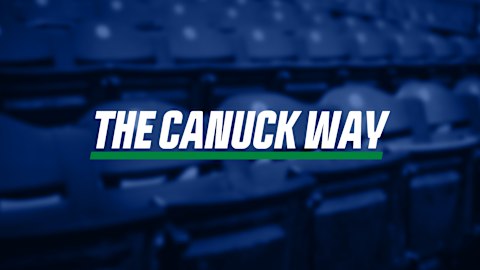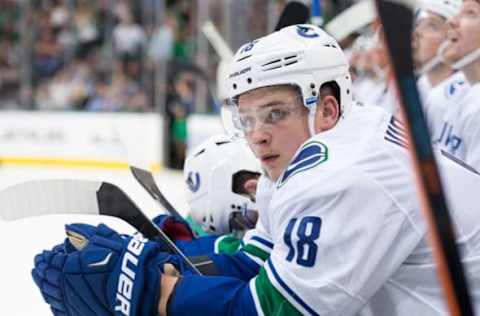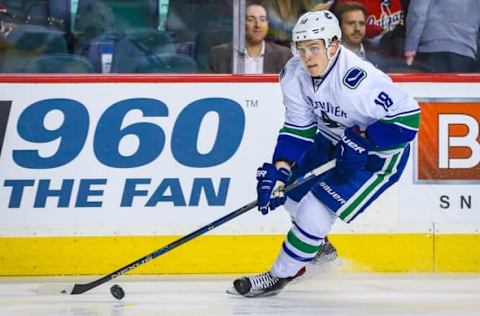Vancouver Canucks Jake Virtanen: NHL vs. AHL in 2016-17


Vancouver Canucks forward Jake Virtanen had a tough rookie season and a case can be made for starting him in AHL Utica this year.
Eight of the 30 first-round picks from the 2014 NHL Entry Draft made their debuts in the 2015-16 campaign, including Vancouver Canucks forwards Jared McCann and Jake Virtanen. Since McCann got traded to the Florida Panthers for help on the blue line this offseason, we don’t need to worry about his role anymore. But where does Virtanen slot in for 2016-17?
Thanks to the NHL’s agreement with the Canadian Hockey League, there were only two options for Virtanen: Vancouver Canucks or WHL Calgary Hitmen. The Canucks chose to keep him in Vancouver for the whole season, with exception of the 2016 World Junior Championship in Helsinki, Finland, where they loaned Virtanen to Team Canada.
Virtanen had some bad luck — this is you last chance to call him dumb — and took a lazy penalty or two that may or may not have led to a quarterfinal exit against the eventual champions from Finland. After that, many Canucks fans called for him to be sent back to junior, but as I already pointed out at the time, the club made the right decision in keeping him around for the rest of the year.
But now that Virtanen turns 20 years old and is therefore eligible to play for the Utica Comets in the American Hockey League, is the NHL still the best option? Let’s discuss.
Next: By the Numbers

By the Numbers
Most people that complain about Virtanen’s rookie performance are those that look at just two things:
- Virtanen’s goal and point totals
- William Nylander‘s and Nikolaj Ehlers‘ point totals
Back in 2014, there were many who would have liked to see Vancouver pick Toronto Maple Leafs prospect William Nylander or Winnipeg Jets prospect Nikolaj Ehlers over Virtanen. Now two years removed from the draft, it is easy to look at those three players and say: “Nylander only needed 22 games for 13 points and Virtanen needed 55 — he can’t f-ing score” or “Ehlers has 38 points — he’s so much better!”
Please, don’t be that guy.
Of all Canucks that played in 40 or more games, Virtanen had by far the fewest ice time. In 55 games, Virtanen played around 50 minutes of five-on-five time less than Luca Sbisa in 41 games. Now, you could say he got sheltered minutes which should only help him. But look at this:
In five-on-five situations, Virtanen had 182 offensive zone starts versus 167 in the defensive zone and 194 in the neutral zone. Daniel Sedin, for example, had 414 offensive zone starts versus 289 in the defensive zone. Now that’s how you make offensive production easy for a player (note: this does in no way intend to bash Daniel Sedin).
Related: Jake Virtanen carries his teammates
Despite playing few minutes and many of them starting in the defensive zone, Virtanen led the roster in Corsi-for percentage. In fact, Virtanen and Dan Hamhuis were the only two players who posted Corsi-for percentages above 50 percent. Virtanen came in at 51.04 percent, followed by Hamhuis (50.12) and Henrik Sedin (49.39).
His relative numbers display the same thing. A relative Corsi-against per 60 of -6.62 and a relative Corsi-for percentage of 3.44 are both team-best numbers. By far.
You can see all of that in his HERO chart as well — first-line level productive possession.


Getting his scoring going
It is understandable that some of you don’t care about that kind of numbers. Virtanen was picked sixth overall, so he better be a top-six power forward, not a fourth-line grinder. I get it. But being solid defensively — as in leading the team in major defensive categories — is an outstanding foundation.
Still, Virtanen had 45 goals in 71 games for the Hitmen in his draft year. So where is that scoring?
I wish we could just put Daniel Sedin, Vancouver’s top goal and point producer of 2015-16, on the fourth line and play him eight minutes a night for 55 games. See what his defensive numbers would be like and how many goals he would score on a line with Derek Dorsett and Adam Cracknell. I have no doubt that he would get more than Virtanen’s seven goals and 13 points, but it also isn’t a fair comparison.
More from The Canuck Way
- Which team won the Bo Horvat trade?
- What to expect from newcomers Anthony Beauvillier, Aatu Räty
- Back to the future: How the skate uniforms became a regular Canucks’ feature night
- Canucks kick off 2023 with disappointing 6-2 loss to Islanders
- 2nd period penalty trouble sinks Canucks in 4-2 loss against Winnipeg
Virtanen made the jump from junior to the NHL but wasn’t exactly put in a position to succeed. The Detroit Red Wings and most recently the Toronto Maple Leafs and Edmonton Oilers proved that an additional year in juniors and/or a year or two in the AHL can work wonders.
Just three picks before Virtanen, the Oilers selected German forward Leon Draisaitl of the WHL Prince Albert Raiders. He had 110 points in his draft year and the Oilers decided they needed his power forward game right away. So, they kept him in the league for 37 games. Unfortunately, Draisaitl scored just two goals and nine points in that time, so Edmonton decided it would be better to send him back to the dub.
Draisaitl was traded to the Kelowna Rockets, had 81 points in 51 games including playoffs, won the WHL championship, was named playoff MVP, got to the Memorial Cup Final, won the Ed Chynoweth Award as the tournament’s top scorer and the Stafford Smythe Trophy as the Memorial Cup MVP. The next season, he returned to Edmonton after Connor McDavid‘s injury, and 51 points in 72 games.
In a slightly different scenario, the Maple Leafs let William Nylander split his draft-plus-one season with Swedish club Modo and the AHL Marlies. He then started and finished the 2015-16 season with the Marlies, but also got to play in 22 games for the Maple Leafs. Nylander has 32 goals and 77 points in 55 AHL contests over the past two years, as well as six goals and 13 points in the NHL.
It is impossible to guarantee that Virtanen would do the same. But it is also hard to imagine that he wouldn’t score goals and build up his confidence if he started the 2016-17 campaign in Utica.
Next: The case for the NHL

The case for the NHL
Turning Virtanen into a scorer should be close to the top of the Vancouver Canucks’ priority list. But since he is an extremely valuable defensive player, they also kind of need him in the NHL. The problem here is that there’s a good chance that he would be stuck in the bottom six again.
But even there, Virtanen would be an incredibly important player. Elite Prospects scout Curtis Joe describes it nicely: “[Virtanen] possesses a non-stopping motor and creates an abundance of on-ice energy when throwing his weight around and establishing his physical presence.” Virtanen is the perfect bottom-six player for the modern NHL, as he combines physicality with offensive skill.
Do we want him there, though?
More from Canucks News
- Canucks are in “wash, rinse, repeat” mode after Monday’s 5-1 loss
- Canucks send Jack Rathbone and Vasily Podkolzin down to Abbotsford
- Canucks acquire Ethan Bear, Lane Pederson from Carolina
- Brock Boeser, Curtis Lazar placed on injury reserve
- Canucks officially unveil Reverse Retro jersey in latest aesthetic change
If the Canucks want Virtanen to become a top-six power forward eventually, they can’t park him in the bottom six and force him to be a defensive player. He needs to be trusted to play in crucial situations and get time on a scoring line with Bo Horvat and Sven Baertschi, which looked very promising at the end of the 2015-16 season.
I would even love to see Virtanen play on a line with Daniel and Henrik Sedin. As Jannik Hansen showed, a hard-working player with a nose for the net is all the twins need as their complimentary player. Virtanen possesses both of those attributes.
Playing with more talented players and, perhaps even more importantly, playing at all could greatly improve Virtanen’s development. He was a healthy scratch for many games last season and only played a maximum 10 minutes when he played. That isn’t enough to give a young player confidence, and it also isn’t enough for a young player to develop his game. Virtanen has a long way to go, but only ice time can turn him into the player he is supposed to become.
The 2015-16 campaign showed that he can play in the NHL. There is no doubt about it. He just needs to get a chance to play the way he wants to play and play the way he plays best.
Next: Outlook

Outlook
So what will happen?
A lot depends on the Canucks’ success in free agency that starts today. If they pick up at least one right winger, Virtanen is probably down in the AHL. The new winger(s), Hansen, Derek Dorsett and one of Alex Burrows and Emerson Etem should have better chances at a spot in the lineup, given their contracts. That is at least my hope. Rotating Virtanen in and out of the lineup for Etem and/or Dorsett, like it happened last season, would only hurt Virtanen’s development.
That said, I would argue that Virtanen is a better player than Dorsett, Etem and even Burrows. Without a free-agent addition on the right wing, Virtanen would be the No. 2 behind Jannik Hansen and should get that spot in the lineup as well. It just probably won’t happen.
As much as I believe Virtanen would be an important part of Vancouver’s bottom six, I hope things don’t shake out that way. What he needs now is confidence, and the only way he can get that is through ice time and scoring goals — whether that happens in the AHL or NHL.
There is no guarantee that Virtanen would score a lot of goals in Utica, but his chances would probably increase on an AHL top line instead of an NHL fourth line.
Next: Goalies of the Future: Demko vs. Garteig
If Virtanen has a strong training camp and secures a spot in the middle six, I am happy with that. But if it’s fourth line or AHL when the season is about to start, I definitely vote AHL. Let him gain confidence, be a leader and come back as the first injury call up.
Perfect scenario.
*All advanced stats via CORSICA Hockey